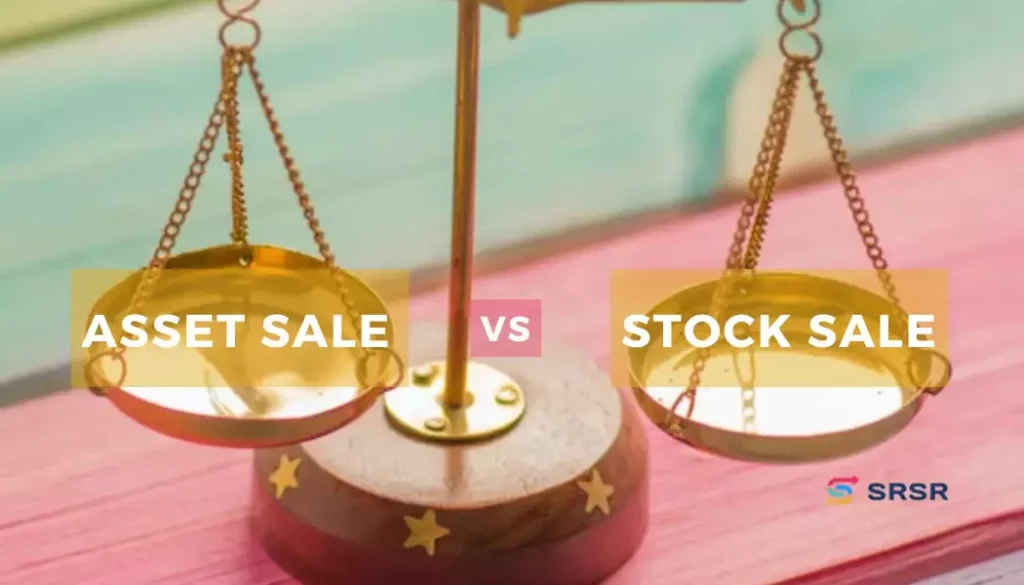You’ve built a successful business, and now you’re ready to sell it and move on to your next venture. Whether that’s starting a different business or retiring on a beach in the Bahamas, first you need to complete the sale of your business. But selling your business isn’t necessarily a straightforward process, and there is more than one way to sell it.
There are different methods of selling your business, but two of the most common are an asset sale or a stock sale.
Either method results in the sale of your business, but they will have different impacts on your taxes, as well as those of the buyer. It’s important to discuss the pros and cons of both types of sale with an attorney and CPA before you decide which way is best for you, because each business’s situation is unique.

Photo by Leeloo Thefirst
What is an Asset Sale and how does it work?
In an asset sale, the seller remains the owner of the original legal entity, the company itself. The buyer purchases the assets of the company. Assets may include physical assets like equipment, buildings, and land. It can also include intangible assets like goodwill, customer lists, phone numbers, and trade secrets. Generally, the purchase would not include the debt or cash assets of the company.
Categories of assets have different tax rules, so the buyer and the seller will need to agree on the value of assets that are purchased. The way the value is allocated affects both parties, and it’s important that both sides agree. Filing tax returns with differing information may open up either side to an audit from the IRS.
What is a Stock Sale and how does it work?
A stock sale is a more straightforward process, where the buyer purchases the company’s shares from the seller’s shareholders. All assets remain the property of the original company. The purchase may include both assets and liabilities, but the buyer may ask the seller to pay off debts or make other changes prior to the purchase completion.
This process is simpler for both sides, but the buyer loses some of the tax advantages that would be provided by an asset sale. However, a stock sale may be beneficial when there are contracts in place that would be difficult to transfer to a new company or for other reasons.
Not every type of business entity can sell through a stock sale. Only C Corporations and S Corporations have company stock. A sole proprietor can only do an asset sale because a sole proprietor is not an entity and has no stock. A partnership also does not have stock; a partnership has partnership interests that may not be transferable, depending on the partnership agreement. An LLCs is more complicated because an LLC is a hybrid entity that may be taxed as either a C-Corporation, S-Corporation, or partnership. .
Difference between an asset and stock sale
There are a few differences to keep in mind when deciding between completing an asset sale vs. a stock sale.
First, the tax implications will be different depending on which type of sale is completed. An asset sale can be more beneficial to the buyer for tax purposes than a stock sale, while the opposite is usually true for the seller. We’ll talk about that more later, but it’s important to keep in mind.
Another difference is the transfer of assets. In a stock transfer, the original business is still owns the property. This may mean that contracts don’t need to be rewritten and each asset doesn’t need to be transferred to the new owner on paper. For these reasons, a stock sale is often simpler than an asset sale. In an asset sale, the new owner may need to obtain licenses and permits, negotiate new contracts, hire new employees, or take other actions to ensure they can continue doing business.
Yet another difference is the transfer of liabilities. In a stock transfer, the new owner may accept liabilities for future lawsuits, product liability claims, and other liabilities. In an asset sale, the new owner typically does not accept the liabilities of the previous owner.
Advantages and disadvantages of an asset sale for the buyer

Photo by Alena Darmel
The seller and the buyer have competing viewpoints. So, the advantages and disadvantages of an asset sale are different for both. In an asset sale, the buyer usually has a more advantageous position.
For the buyer, an asset sale typically has significant tax advantages. The buyer can “step up” the value of depreciable assets (known as furniture, fixtures, and equipment, or FF&E) for a favorable tax position. This allows the buyer to take more depreciation in the early years of their business ownership, since assets such as equipment often depreciate within three to seven years. The early years are often the most important for getting a business started. Hence, this tax advantage could make a major difference for the new business.
Another advantage for the buyer is that they generally do not assume the liabilities of the seller.
And although asset sales may generally favor the buyer, the buyer may face disadvantages such as difficulty renegotiating contracts, getting new licenses or permits, and difficulty transferring ownership of leases or intellectual property.
Advantages and disadvantages of an asset sale for the seller
The seller typically faces tax disadvantages in an asset sale. If the sale includes assets that the seller has already depreciated, the seller may have to pay taxes on the gains of the assets. This is where negotiation is important, because the selling company wants the FF&E to be valued as low as possible to avoid paying taxes, while the purchasing company wants them to be valued as high as possible to maximize their depreciation.
If the seller is a C corporation, they may be subject to double taxation since they may be taxed when assets are sold to the buyer and then the shareholders are taxed again on assets sold.
Advantages and disadvantages of stock sale for the buyer
A stock sale has more disadvantages for the buyer than an asset sale does. In a stock sale, the buyer may not use the stepped-up basis for assets. This is because the asset value is based on the value the seller shows in their books. This may cause the buyer to pay higher taxes in the future.
The buyer may also be subject to more liabilities, such as future lawsuits or other types of unforeseen risks.
Both sides of the transaction can benefit from the simplicity of a stock sale since there is typically less that needs to be negotiated and the sales process is simpler.
Advantages and disadvantages of stock sale for the seller
The seller also benefits from the simplicity of a stock sale transaction. Additionally, shareholders will receive cash at the time of sale and all the proceeds will be taxed at a lower rate.
Sellers may also more easily shift future potential liability to the buyer for issues like employee lawsuits or product liability claims.
How to choose which type of sale is best for your company
Choosing an asset sale vs stock sale is an individual decision, based on the needs of both parties. It’s always wise to seek the guidance of a financial advisor, CPA, and/or an attorney to help you decide the best position for you.
A stock sale is only a possibility if your business is structured as an S-corporation, C-corporation, or an LLC taxed as either. You’ll need to decide on another way to transfer ownership if your business is a sole proprietorship partnership, or LLC taxed as a partnership.
There are several items to consider before you make your decision between an asset sale vs a stock sale. Here are a few of the most important things to think about.
Tax Implications
Consider the tax implications and the costs associated with both types of sales. You may need to call in experts like appraisers to assess the value of your assets and a CPA to walk you through tax implications. These professionals will have fees associated with them. Still, understanding the tax implications before settling on a price and the type of sale is imperative.
Legal Ramifications
Next, think about the legal ramifications of both types of sales. If you complete an asset sale, will assets like patents, contracts, intellectual property, etc. be easily transferred to the new owner? How much will it cost to file paperwork and hire the professionals needed to implement these changes? Will new contracts need to be negotiated? Who will cover these costs? What will happen to the debts or potential future liabilities of the business being sold?
A stock sale can allow easier transfer of the business, with less paperwork and negotiation. A stock sale may be most beneficial to you as the seller. Though you may have a more difficult time finding a buyer if you’re unwilling to consider an asset sale. You need to look out for your best interests, but you may also need to be flexible with your expectations.
Final thoughts on asset sale vs. stock sale
Negotiation is a tool you can use in your favor. If you make concessions, the buyer may also be willing to make concessions. They may pay more for the business or be willing to adjust the asset valuation so it is more favorable to you. For example, if you agree to an asset sale instead of a stock sale.
No matter how you sell your business, having a team of professionals on your side will ensure you understand all the ramifications of the sale and can negotiate the best position. CPAs, financial advisors,, and attorneys are invaluable resources who should be engaged before you even enter the negotiation process.
You can’t sell your business without a buyer. However, finding a buyer in the market for your type of business can be challenging. Learning how to sell a business online can simplify the process of finding a buyer.
Do you have more questions about how to choose between an asset sale and vs a stock sale? Ask us in the comments below!

